Is your family ready to welcome a furry little doxie into your home? If so, you may be wondering what to expect in terms of development at the 11 to 12 week mark – and after all, who better to learn from than proud sausage pup parents? In this article, we will have a look at our dachshund puppy’s development at 11 to 12 weeks old.


Our Dachshund Puppy’s Development at 11 to 12 Weeks Old – Table Of Content:
- Our dachshund puppy can finally go for a walk!
- How long should you walk your dachshund puppy
- Name association and re-call training
- Biting and chewing is getting worse
- First time having a bath
Our Dachshund Puppy’s Development at 11 to 12 Weeks Old
Remember how full of energy your puppy was when 10 weeks old? Well, get ready for the next few weeks ahead! Although your puppy will still sleep a lot during the day at this stage, they will be super active with boundless amount of energy when awake. The best way to channel all that energy is through plenty of exercise, socialisation and mental stimulation.
Our puppy has grown even more confident and adventurous especially when on walks during this development stage. And is ever so curious about everyone and everything going on around her. She has started learning more about the world around her and it’s a joy to see her so happy and engaged.

Our dachshund puppy can finally go for a walk!
The day had come when it was finally safe for Daisy to go for a walk on the ground and socialise with other dogs! This was one week after her second (and last) core vaccination. By this time she was absolutely desperate to have a run in the park. She was so excited and keen to sniff all around the park we could barely hold her on the lead.
When on walks, you should encourage your puppy to socialise and engage with other people and dogs. As they grow more confident, they are less likely to become reactive. We would recommend keeping your puppy on the lead at all times and always asking the other dog owner’s permission before you approach them. Some dogs may be reactive or bothered by energetic puppies so it’s always best to check. And don’t be put off by the larger breeds, your puppy should solialise with all breeds, even if much larger.
If you come across a reactive dog, do not respond in a negative way but instead reassure your puppy that all is fine. Try not to avoid the situation but instead relax and approach it with confidence. Your puppy will be probably scared and may whine but that’s normal and if you remain calm they will soon calm down themselves. Just reward them with lots of praise and a treat once calm. They need to learn how to behave around reactive dogs and the sooner they learn the better because they will bump into them every now and then.

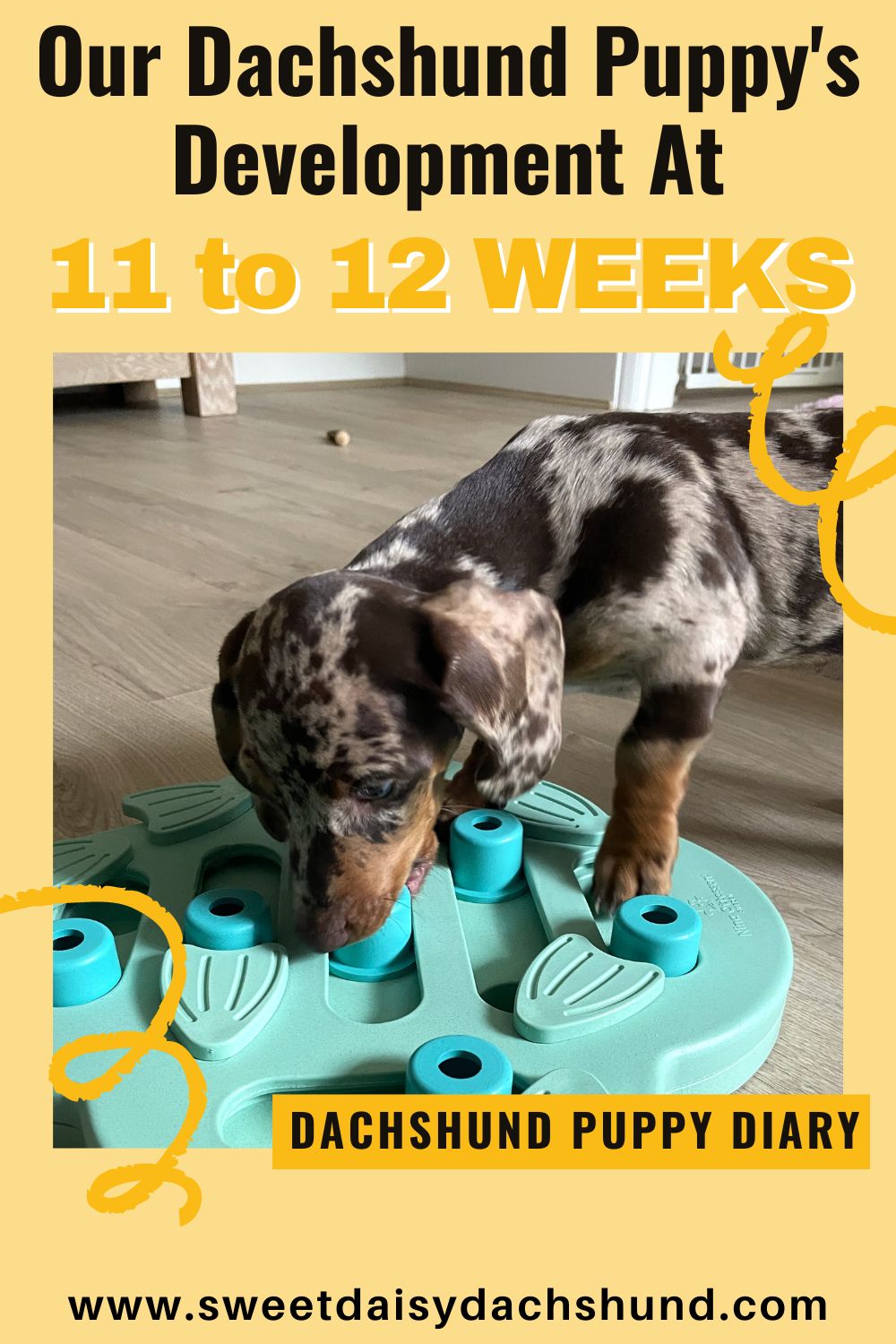
How long should you walk your dachshund puppy
Although your puppy will be very keen to walk around the park for hours, you have to keep an eye on the length of their walk at this age. Your puppy’s bones and joints need time to mature and are at risk of getting demaged if you over exercise your puppy. To much exercise can lead to medical issues so follow the general rule of 5 minutes per month of age.
Below is a summary of how much you can exercise your puppy:
- 2 months of age = 10 minutes per day
- 3 months of age = 15 minutes per day
- 4 months of age = 20 minutes per day
- 5 months of age = 25 minutes per day
- 6 months of age = 30 minutes per day
- 9 months of age = 45 minutes per day
- 12 months of age = 60 minutes per day
I know this doesn’t seem much, but don’t worry. This doesn’t include running around the house or your garden. The above guidance refers to on-lead walking only because your puppy can’t self regulate when being walked on their lead. If your puppy has the freedom to run around freely (even if allowed off the lead in the park), they will stop and rest when they get tired.
Daisy absolutely loves going for a walk in the park so we split the daily time allowance into two shorter walks per day. This also helps to tire her out and burn some of her never ending supply of energy! She likes saying hello to people and loves playing with other dogs, which helps with the socialising. Sometimes it can be hard having to listen to her cry when we put her back in her carrier. She just loves her outings so much that we started training her recall quite intensively so we can let her play in the park off-lead as soon as she is ready.

Name association and re-call training
We started name association training with Daisy the first week with us and that was just a few minutes per day indoors. It was nothing too overwhelming but it’s good to start early and build up gradually as this forms really good basis for recall training. We continued to train her indoors using different rewards and games before we moved to the next step. This was to start recall training in the garden where there are more distractions around. This step will take a bit longer for your puppy to master before you can start training in the park or field.
We will give you an update on how we are getting on with the re-call training in our next diary entry. We will also give you a few tips on how to approach the name association and re-call training so stayed tuned! 🙂

Biting and chewing is getting worse
Last time, we promised you to talk about biting and chewing in more detail so here we are. Daisy’s biting and chewing got a lot worse as she turned 11 weeks and this is because she started approching the teething stage. Normally puppies start teething around the age of 12 to 14 weeks so we know the biting and chewing will get even worse and we need to be prepared for it.
There are a few ways how to manage this stage of their development:
– start behaviour training with your puppy from week one and use a strong verbal cue to let them know that what they are doing is wrong. Your body language and the tone of your voice play an important role. Your body language needs to translate to ‘I am the boss here’ and your voice needs to be stern and confident, however not loud and shouty. Re-direct your puppy’s attention to a different toy or activity and do not forget to reward your puppy with lots of praise once they calm down because it helps them understand what behaviour is expected of them.
– exercise your puppy both physically and mentally. At 11 to 12 weeks of age, your puppy will be very active and full of energy. You need to find a way to burn your puppy’s energy so they don’t get up to lots of mischief. We already mentioned how much to exercise your puppy physically but it is just as important to exercice their mind.
– purchase various types of toys and chews before you even bring your puppy home. Your puppy will be already biting and chewing to some degree and it will gradually get worse before it gets better so you’d better be prepared. Hardy and chewable toys are essential if you want to protect your personal belongings. We purchased a selection of toys but we must admit that natural chews are simply the best! Daisy absolutely loves them and they keep her entertained and out of trouble for what seems like hours. Plus they keep her teeth nice and clean so there is no need for us to brush them.

Below are Daisy’s favourite toys and natural chews:
- squeaky balls – these are ever so popular
- rope toys – Daisy prefers these to soft toys as they are harder to sink her teeth into
- rubber rings
- puzzle games
- snuffle mat
- Kong
- split antler – an absolute must in our opinion
- olive stick – Daisy is obsesed with chewing sticks and wood so this one is a good option
- hollow cow hooves
- rabbit ears (without fur to start with)
- any natural ligaments or trachea
- bull pizzle
As your dachshund puppy grows up, you will find yourself replacing lots and we mean lots of destroyed toys so don’t invest too much money into buying fancy and expensive toys. Having said that, a good puzzle game is a toy that will last and provide hours of entertainment.
We personally love the Nina Ottosson range of dog toys and puzzles, because they are very sturdy and keep our puppy occupied for ages. They are excellent puzzles made of safe materials that are easy to clean and they do last a long time too. You can choose from 4 different difficulty levels to suit the age of your pup. Explore the full range on Amazon UK or Amazon US.
Also make sure to check out this article for further details and advice on Best Ways to Dachshund Proof Your Home!
First time having a bath
In our last diary entry, we mentioned that we started preparing Daisy for her first bathtime. She found our bathroom a bit frightening so we took our time with the training and introduced her to the sounds of the bathroom and the feel of water gradually. It took about a week and a half before she was ready for her first bathtime.
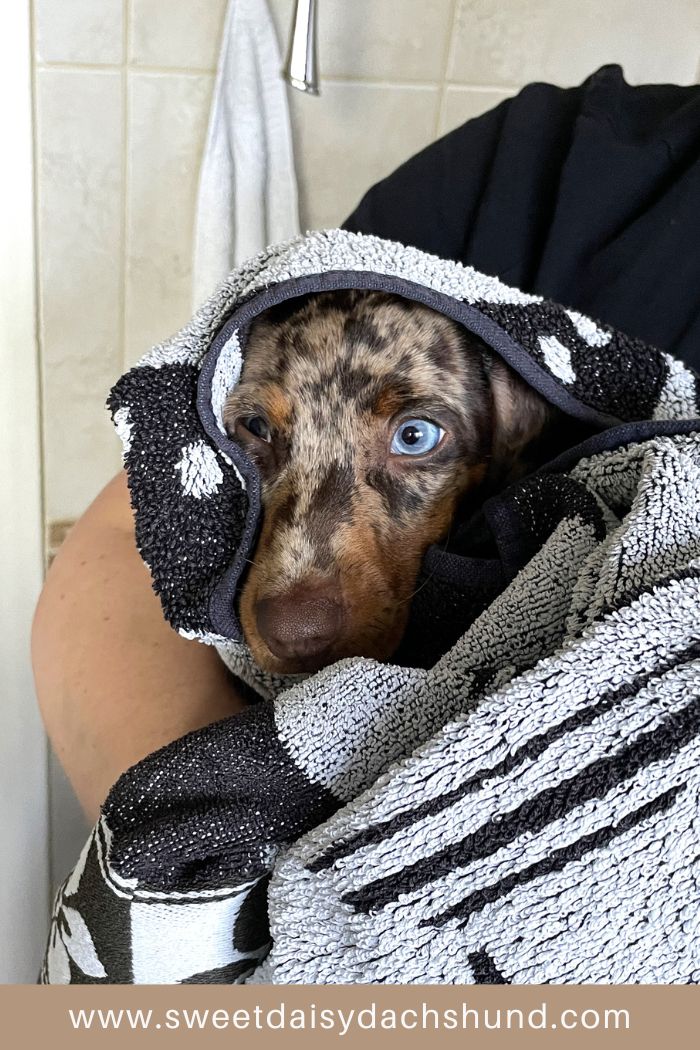
These are the steps you can take to make the bathtime a bit more relaxing for your puppy:
- start by scattering treats on the bathroom floor while leaving the water tap/shower running
- feed your puppy their meals in the bathroom while leaving the water tap/shower running
- when they feel more comfortable inside the bathroom progress to the next step
- place them inside the bathtub but don’t fill it with water yet; leave the water tap running; reward with lots of praise and treats
- fill up the bathtub with little bit of warm water and put your puppy in it (Daisy found it less scary when our daughter went in the bathtub with her); reward with lots of praise and treats
- repeat the above step a few times and splash some water over their body too
- when they feel more comfortable inside the water then you can go ahead and give your puppy a proper wash with shampoo
Bear in mind that it will be your puppy’s first time having a full-on wash so they may still not like the experience despite of you taking the steps above. Although Daisy was relatively calm when we washed her, we could tell that she did not enjoy it. And only time will tell if she learns to love it.
Our Dachshund Puppy’s Development at 11 to 12 Weeks Old – Watch Us On YouTube
Our dachshund puppy’s development at 11 to 12 weeks old. If you would like to see what Daisy was up to and how much she enjoys her natural chews then make sure to watch our video below.
Our Dachshund Puppy’s Development at 11 to 12 Weeks Old – Let Us Know What You Think!
Let us know if you found this article helpful in the comments below. We love to hear your feedback!
Join ‘Dachshund Buddies’ On Facebook!
Join our ‘Dachshund Buddies’ Facebook community dedicated to all things dachshund! It is a great way to connect with other dachshund owners and enthusiasts, who are always there to help each other. You will find plenty of interesting conversations and valuable tips, tricks and advice to help you care for your loving doxie.
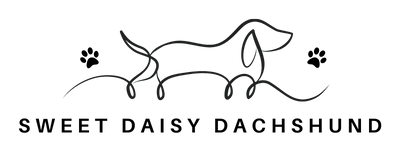
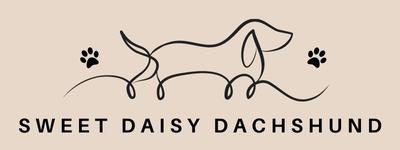



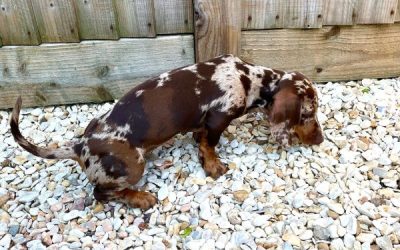


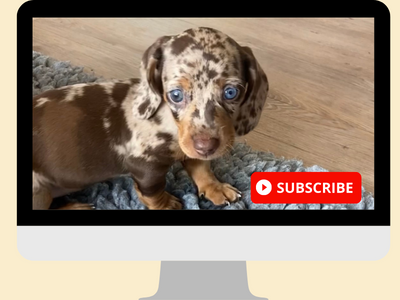
0 Comments